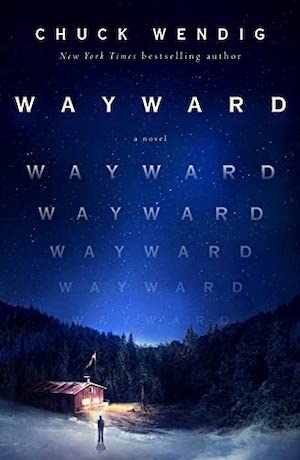For the last five years, Ouray, Colorado has been the home of the Flock. For most of that time, only the Shepherds were around to tend to the abandoned town, but recently they woke up. Years of stasis means that Shana is still pregnant, a situation that would be unnerving enough on its own but is made worse by her pregnancy progressing entirely too fast. Black Swan is back with a new plan to fix what didn’t work the last time. And it needs Shana’s child to do it. A few states over, Ed Creel, the self-declared President of the United States, has spent most of the last few years in his rich people apocalypse bunker. But it hasn’t been much of a vacation. Violence, abuse, depravation, and murder spread like a disease amongst the Richie Riches until Creel finally escapes the pit. He’s not alone. A terse, enigmatic woman has plans for him and he’ll have to go along with them whether he likes it or not.
When circumstances in Ouray deteriorate, Benji and Shana realize the only way out is to stop Black Swan once and for all.
It was created in the CDC, so that’s where they decide they’ll have to go to end it. Creel and his companion also want whatever is hidden in the underground walls of the CDC, and they turn to his lost army of fascists and racists to get it. So there are your three main groups: the Flock led by Black Swan, the deplorables led by Creel, and the Shepherds Benji, Shana, and Pete. Along the way, we meet other survivors, some who have embraced the new world with gusto, some who have carved their initials into it to claim it as theirs, some who drift like a leave in the breeze, some who are becoming increasingly untethered to the world around them, and some who are working to make a better future.
Buy the Book


Wayward
Usually for me, reading a Chuck Wendig joint means being consumed by it, gradually at first then all at once. I often read his novels, regardless of length, in a few sittings because I simply cannot put it down. His books get their claws in me. There’s just something about them that makes it impossible for me to look away. Wayward was different. It took me a couple of weeks to read it. Not because it’s bad—it’s absolutely not—but because the pandemic stress and anxiety of the last two and a half years made it a challenging experience. Each chapter has an introductory quote from musicians, reporters, bits of ephemera left during the apocalypse, that sort of thing. One that recurs are the journal entries from a woman known only as The Bird who details her experience of life, near death, and partial recovery after White Mask has already devastated the world. Her journey most closely mirrors that of the hell that is covid. Every time her entries popped up, I both dreaded and desperately needed to know what she was going to say.
Wayward was written, in fits and starts, during the pandemic, and it’s impossible not to see how the real world bled into the fictional one. Could Wendig have written it without the pandemic? Sure, of course. It would’ve been a great science fiction thriller with lots to say about the human condition. But this version of the story feels tangible and truthful. It doesn’t feel so much predictive like Wanderers did but more like a reckoning or a reconciliation. Like catharsis. Like understanding. It’s not just a story of what could be but of what was and is and is still to come.
Although the novel clocks in at over 800 pages, it never felt too long to me. Your tolerance for interstitials, side quests, and reminiscences will have a lot to do with whether or not you think that length is merited. Personally, I loved the “extra” stuff outside the main plot, yes, even when he took us into the mind of Gumball the Very Good Dog. I love the way Wendig does worldbuilding, so spending more time exploring this ravaged near-future was a pro rather than a con. It never felt like Wendig was killing time or looking for obstacles but that he was building to something important.
It’s easy to reduce Wayward as a rehash of Wanderers, but I think that misses the point of both. In the first, Black Swan was this impenetrable, inevitable force. In the second, it’s, well, to avoid spoilers let’s just say it’s more, a whole lot more. AI isn’t some neutral, objective data stream; it is what we make it. In computer science, you’ll hear the acronym GIGO, for “garbage in, garbage out.” Black Swan is the sum of its parts and those parts were compiled by messy, complicated, overly enthusiastic, capitalistic humans. We are a world that produces vile people like Ed Creel and his fascist followers, those who think of themselves as good but who do terrible things like Pastor Matthew, good people working in bad systems and trying to stay honest like Sherriff Marcy, decent folk who didn’t make the mess but are going to clean it up anyway like Benji and Shana, agents of pure chaos like Pete Corley, and arrogant assholes who think they are gods of creation like the scientists who developed Black Swan years before. All of that went into Black Swan as much as it went into the humans populating its world. It may be a machine, but it was built from our minds. To put it bluntly, Black Swan is us.
If Chuck Wendig’s Wanderers was about the journey to Colorado, then Wayward is about the journey from it. We don’t know where the Flock is headed for much of the first book; as readers we’re along for the ride as much as the Shepherds and hangers on are. Wayward offers us a clear destination: the CDC. Who’s going there, what they want, and the extremes they’ll go to get it are what makes this sequel an intense thrillride. It was everything I love about Wendig’s books and then some.
Wayward is published by Del Rey.
Alex Brown is a Hugo-nominated and Ignyte award-winning critic who writes about speculative fiction, librarianship, and Black history. Find them on twitter (@QueenOfRats), instagram (@bookjockeyalex), and their blog (bookjockeyalex.com).










